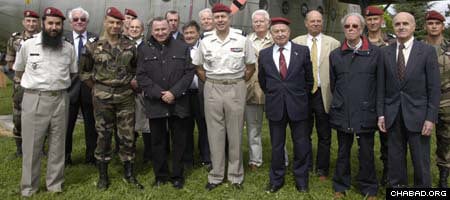Moroccan-born Rabbi Gavriel Sebag is one of 33 Jewish chaplains overseeing the wellbeing of Jewish soldiers and officers of the French armed forces. Most of them are based around Paris, but Sebag – one year into his job in the French Army – is based out of the southern city of Toulouse and serves seven regiments stationed within a 200 km circumference of the city.
It's a job with a wide territory made all the more challenging due to the fact that no one really knows how many Jews are in French uniform. The government doesn't keep any statistics, and Sebag, a Chabad-Lubavitch rabbi who also works at the city's Chabad House, sees a good part of his mission as "boosting moral to as many soldiers as possible."
"I have also been there to serve non-Jewish soldiers who have sought out my help," he says.
Sebag, or Rav Gavriel, as he is often called, is free to divide his time between his seven bases in the way he sees best fit. He wears a uniform and occupies the same station as an officer, but in keeping with tradition holds no rank.
"I try to devote at least two days a week to the chaplaincy," he details. "It is an interesting job because each base has a different make up. Some of the bases have fewer than 100 soldiers, others more than 1,500. Some have only one known Jew while others have many.
"Since the needs are so varied, it is hard to make a rule about my tasks and the time to devote to them."
Officially, Sebag's role is to provide Jewish soldiers with religious instruction, supply them with kosher food and help them celebrate holidays and Shabbat.
"With some soldiers, I don tefillin, with others I pray and learn," he elaborates. "With each individual I spend time with, we do something different, as each individual has specific characteristics and needs."
He uses the same varied approach in his work with school children – he teaches religion at the Toulouse's non-denominational Jewish school – university students and couples about to be married.
Working With Souls

The country's legal sanctioning of the office at first glance runs counter to the popular notion of France being a bastion of anti-religious sentiment. But even its 1905 law banning any form of religion in public life contained one exception: the military.
France's defense minister is in charge of naming and coordinating the three Chief-Staff-Chaplains who, in turn, choose civilian clergy of their denomination to serve as chaplains in the armed forces. Sebag says that his path to the uniform, authorized by then-Chief-Staff-Chaplain Rabbi Claude Maman in Bordeaux, was quite simple.
"During my years as a rabbi in Toulouse's Jewish community, I had a lot of contact with" Maman's congregation in Bordeaux, "whom I helped out whenever needed, whether for organizing an event or supplying them with shmura matzah on Pesach and mishloach manot on Purim," he relates. "Rabbi Maman and I got along very well together and he recommended me for the position."
Today, he maintains an equally good relationship with Maman's successor, Rabbi Moshe Taieb, and with the Chief Jewish chaplain of France, Rabbi Haim Corsia. He describes both men as mentors.
But Sebag's real inspiration came from the Lubavitcher Rebbe, Rabbi Menachem Mendel Schneerson, of righteous memory.
"When the Rebbe sent me to Toulouse in 1986, I did not try to figure out how it's all going to work, what we're going to do," he says. "We just did it. I think that most emissaries feel this way. In time, I learned that the work is miraculous, not measurable to our talents or capabilities.
"But it makes sense, in some way," he continues. "We're working with people's souls and that is amazing."
In particular, Sebag is particularly delighted when he encounters men he's known since their circumcision or former bar mitzvah students.
"It is so comforting to see many of them now with their own children," he says. "But one of the highlights of my life was encountering an officer of the French Navy, who recognized me out of an enormous crowd of people."
The former bar mitzvah student came up to the rabbi "during the official, national ceremony of remembering the deportations of Jews by the Nazis," he continues. The moment "was a true pleasure indeed."





Start a Discussion